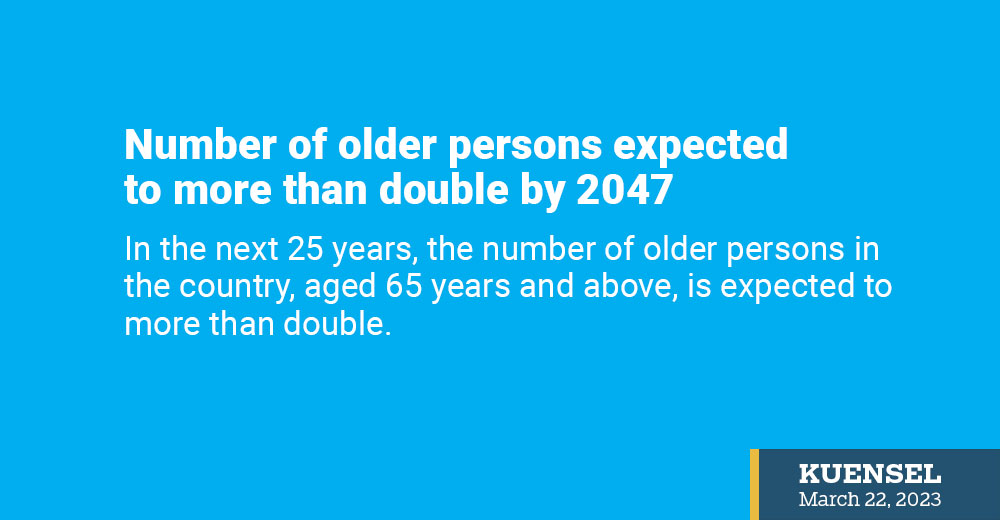Thukten Zangpo
In the next 25 years, the number of older persons in the country, aged 65 years and above, is expected to more than double.
The number of older persons which was at 50, 715 in 2022 is expected to reach 118,650 persons by 2047.
According to the United Nations Population Fund’s (UNFPA) recent report “Population Ageing in Bhutan: Current Situation and Future Prospects 2022”, higher life expectancy at birth compared to a few decades ago and low fertility will shift the population towards an older age structure.
It is projected that the female life expectancy at birth of 72.8 years in 2022 will increase to 78.5 years in 2047. Similarly, male life expectancy is expected to increase from 69.9 years to 75.2 years in the same period.
Currently, the country’s fertility rate at 1.8 per woman is below the replacement level of 2.1 per woman.
This could result in the share of the population aged 65 years and above increasing to 13.4 percent of the total population in 2047.
More older persons could increase the old age dependency ratio from 8.7 older persons for every 100 persons of nominal working age (15-64 years) in 2017 to 19.3 percent older persons per 100 persons in 2047.
With higher female life expectancy compared to male and their different experiences, older women often could face greater gender-based discrimination and are more likely to be widowed, more likely to be financially dependent, and also likely to spend more years in poor health relative to men.
The report recommends that special attention be given to the vulnerabilities that many older women face.
More than 2,800 (6.6 percent) older persons were living alone in 2017; 13.9 percent of older persons were living with their spouse or partner only.
According to the report, the two most common living arrangements are living with a spouse and children (more common among men than women) and living with children only (more common among women than men, probably linked to the higher incidence of widowhood among women).
Living alone is likely to be especially susceptible to social isolation and loneliness, according to the report and recommends that the government devise interventions to involve communities and local governance bodies to take care of older persons in remote areas.
More than half (57.5 percent) of the older persons in Bhutan were not working in paid employment in 2017. It is evident that there is no fixed age for retirement and they continue to work in farming, especially in rural areas.
The report states that literacy status among older persons is low with only around one in five older persons in Bhutan was illiterate in 2017.
To address financial security, the nation could establish a social protection programme, with social protection floors that can be sustained over the long term to prevent poverty, reduce inequality, and promote social inclusion among older persons.
The report calls for the nation to develop a national policy for older persons to promote active and healthy ageing. “Policy measures are critical to addressing population ageing and for achieving the sustainable development goals.”
It also recommended a designation or creation of a new department to oversee the planning, implementation and monitoring of programmes to focus on active ageing and the situation of older persons.
It would also require the capacity building of health professionals for geriatric care, including long-term care and treatment, as well as expanding hospital capacity and creating special facilities in the hospitals and health centres exclusively for older persons.


